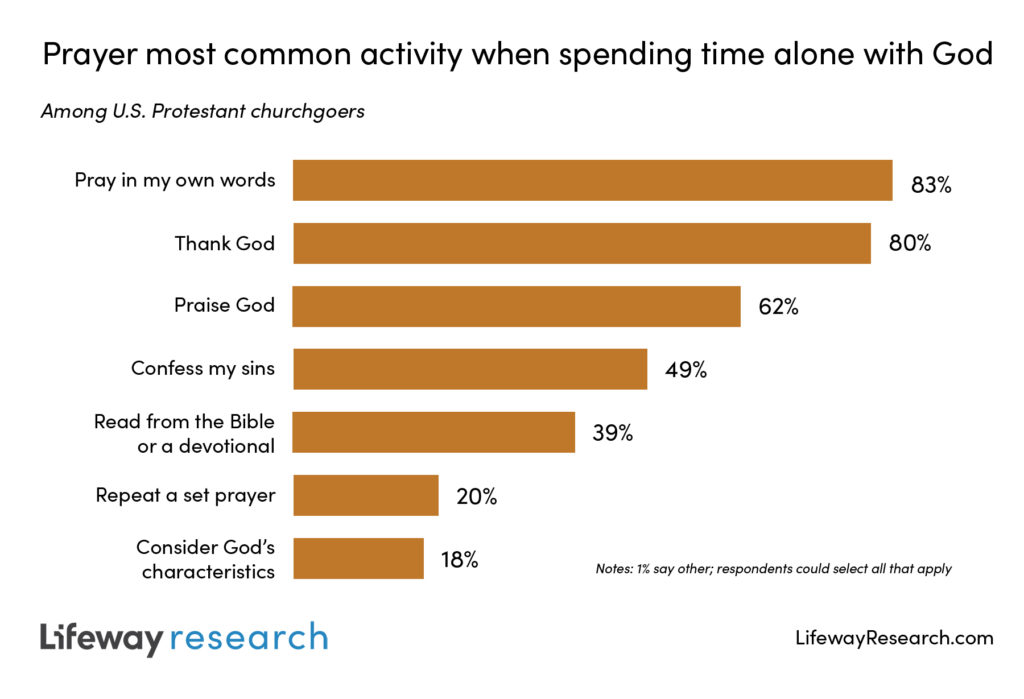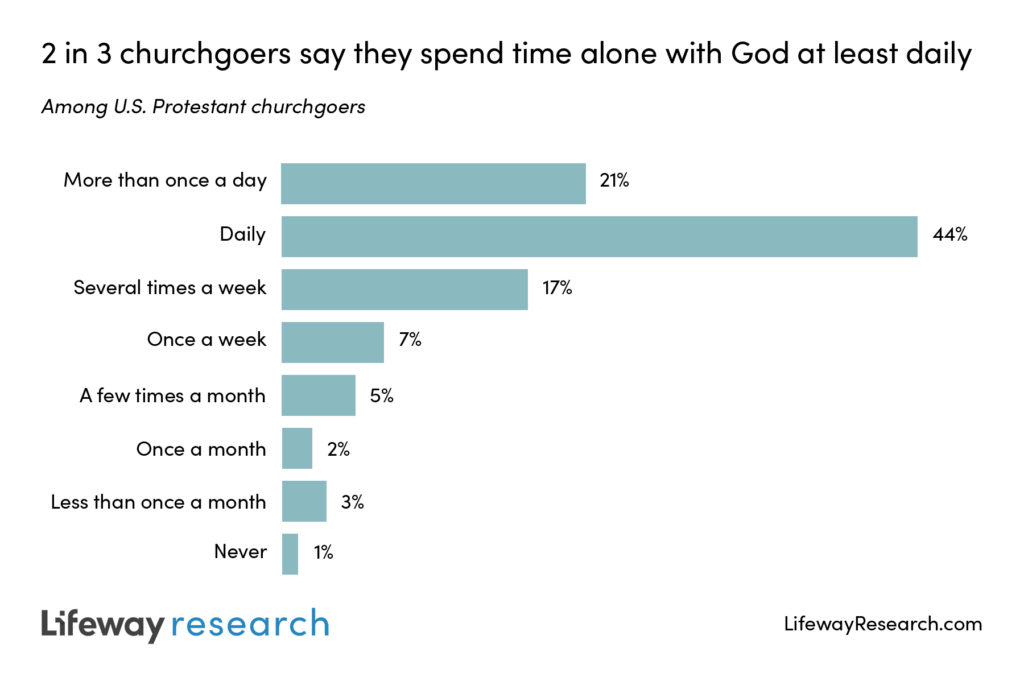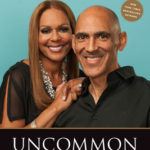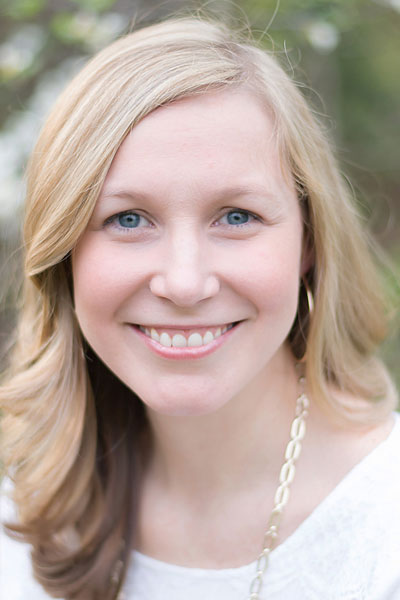
NASHVILLE (BP) – Most Protestant churchgoers spend time alone with God at least daily, but there’s a range in what they do in that time and what resources they use.
According to a study by Lifeway Research, nearly 2 in 3 Protestant churchgoers (65 percent) intentionally spend time alone with God at least daily, with 44 percent saying daily and 21 percent saying more than once a day. Meanwhile, 17 percent of churchgoers say they are alone with God several times a week, and 7 percent say once a week. Others admit to being alone with God a few times a month (5 percent), once a month (2 percent), less than once a month (3 percent) or never (1 percent).

This time looks different for different churchgoers, but they are more likely to talk to God through prayer than to listen to Him through His Word. Churchgoers most often pray in their own words (83 percent), thank God (80 percent), praise God (62 percent) or confess sins (49 percent). Fewer than 2 in 5 read from the Bible or a devotional (39 percent). Fewer repeat a set prayer (20 percent), consider God’s characteristics (18 percent) or something else (1 percent).
But if churchgoers were to read something during their time alone with God, most would read from a physical Bible (63 percent). Others would read the Bible in a different format such as a Bible that includes additional commentary or devotional thoughts (25 percent) or Scripture from an app (20 percent). Fewer than 1 in 3 say they would read from a devotional book that prints some Scripture (32 percent), and even fewer say they would read from a devotional book that doesn’t print Scripture (8 percent). Still, others say they would read a devotional from an app (7 percent) or read something else (3 percent).
Quiet time frequency
When it comes to spending time alone with God, females (48 percent) are more likely than males (38 percent) to say this is a daily habit for them. Those in the South (49 percent) are also among the most likely to say they spend time alone with God on a daily basis. One in 4 Baptists (25 percent) say they have alone time with God more than once a day. And those with evangelical beliefs (30 percent) are more likely than those without evangelical beliefs (15 percent) to say the same. Church attendance is also an indicator of quiet time frequency. Those attending worship services at least four times a month (26 percent) are more likely than those who attend one to three times a month (13 percent) to say they spend time alone with God more than once a day.
“We see a pattern in Scripture of followers of God withdrawing to spend time alone with Him. Jesus Christ Himself also did this,” said Scott McConnell, executive director of Lifeway Research. “Most Protestant churchgoers continue this relational interaction with God and use a variety of resources as they do.”
Preferences on prayer
When spending time alone with God, some prefer to pray in their own words, while others would rather repeat a set prayer. Younger churchgoers – ages 18-34 (31 percent) and 35-49 (26 percent) – are more likely than those 50-64 (16 percent) and over 65 (11 percent) to say they repeat a set prayer during their alone time with God. And those ages 50-64 (85 percent) and over 65 (89 percent) are more likely than those 18-34 (77 percent) and 35-49 (77 percent) to say they pray in their own words.
“There are many reasons to pray a set prayer. Whether someone is praying the model prayer Jesus gave or repeating the same request to God each day, these can be meaningful,” McConnell said. “At the same time, Scripture also records Psalms and prayers within its narrative accounts that show how personal and forthright we can be when talking to God in our own words.”
Females (86 percent) are more likely than males (79 percent) to pray in their own words. And those in the South (86 percent) are more likely to pray in their own words than those in the Northeast (77 percent).
Evangelical beliefs and the frequency of church attendance are also factors in how a person prefers to pray. Those who attend worship services at least four times a month are more likely than those who attend less frequently to pray in their own words (85 percent v. 79 percent). But those who attend a worship service one to three times a month are more likely than those who attend more frequently to repeat a set prayer (24 percent v. 16 percent). Those with evangelical beliefs are more likely than those without such beliefs to pray in their own words (92 percent v. 76 percent), while those without evangelical beliefs are more likely than those who hold those beliefs to repeat a set prayer (22 percent v. 16).
Preferences on practice
What it means to spend time alone with God varies from person to person. But there are some indicators of which practices are most important to different demographics of people. While females are more likely than males to say they praise God (66 percent v. 57 percent) or read from the Bible or a devotional (42 percent v. 36 percent), men are more likely than women to say they consider God’s characteristics (21 percent v. 16 percent) when spending time alone with Him.
Older churchgoers – those 50-64 (45 percent) and older than 65 (42 percent) – are more likely than those 18-34 (32 percent) and 35-49 (34 percent) to say they read from the Bible or a devotional when spending time alone with God. And those over the age of 65 are the least likely to say they consider God’s characteristics (10 percent).
Evangelical beliefs and church attendance frequencies are also indicators of a person’s preferences in spending time alone with God. Those who attend worship services the most (four or more times a month) are more likely than those who attend one to three times a month to praise God (67 percent v. 53 percent), confess sins (55 percent v. 38 percent) or read from a Bible or devotional (46 percent v. 28 percent). And those who hold evangelical beliefs are more likely than those who do not hold evangelical beliefs to thank God (87 percent v. 74 percent), praise God (76 percent v. 51 percent), confess sin (64 percent v. 38 percent) or read from the Bible or a devotional (52 percent v. 29 percent). But those without evangelical beliefs are more likely than those with evangelical beliefs to consider God’s characteristics (20 percent v. 15 percent).
“An earlier discipleship study from Lifeway Research showed that praising and thanking God is one of the top five predictors of high spiritual maturity,” McConnell said. “This is a widespread practice among churchgoers when they are alone with God.”
Preferences on resources
Several factors play into what a churchgoer wants to read when spending time alone with God. The youngest adult churchgoers (ages 18-34) are the most likely to read Scripture from an app (40 percent) and the least likely to read from a devotional book that prints some Scripture (21 percent). And females are more likely than males to say they would prefer to read a devotional from an app (9 percent v. 4 percent).
“Today’s Christians have more resources than ever to aid them in spending time with God and His Word,” McConnell said. “As new resources are created, they can encourage someone who, without that innovation, wouldn’t have spent time with God. But there is also a strong relationship between spending time alone with God’s Word and worshiping frequently with others who may encourage you in your walk with God.”
Those with evangelical beliefs are more likely than those without evangelical beliefs to say they would read from a Bible (78 percent v. 52 percent) if they were reading something in their time alone with God. And those without evangelical beliefs are more likely than those with evangelical beliefs to say they would read from a devotional book that doesn’t print Scripture (11 percent v. 3 percent) or Scripture from an app (22 percent v. 17 percent). While those who attend a worship service at least four times a month are more likely than those who attend one to three times a month to say they would read the Bible in their quiet time (70 percent v. 52 percent), those who attend one to three times a month are more likely than those who attend more often to say they would read a devotional from an app (9 percent v. 5 percent).
For more information view the complete report and visit LifewayResearch.com.
Methodology
Lifeway Research conducted the online survey of 1,002 Americans Sept. 19-29, 2022, using a national pre-recruited panel. Respondents were screened to include those who identified as Protestant/non-denominational and attend religious services at least once a month. Quotas and slight weights were used to balance gender, age, region, ethnicity, education and religion to reflect the population more accurately. The completed sample is 1,002 surveys. The sample provides 95 percent confidence that the sampling error does not exceed plus or minus 3.3 percent. This margin of error accounts for the effect of weighting. Margins of error are higher in sub-groups.
Evangelical Beliefs are defined using the NAE Lifeway Research Evangelical Beliefs Research Definition based on respondent beliefs. Respondents are asked their level of agreement with four separate statements using a four-point, forced choice scale (strongly agree, somewhat agree, somewhat disagree, strongly disagree). Those who strongly agree with all four statements are categorized as having Evangelical Beliefs.
- The Bible is the highest authority for what I believe
- It is very important for me personally to encourage non-Christians to trust Jesus Christ as their Savior
- Jesus Christ’s death on the cross is the only sacrifice that could remove the penalty of my sin
- Only those who trust in Jesus Christ alone as their Savior receive God’s free gift of eternal salvation
























